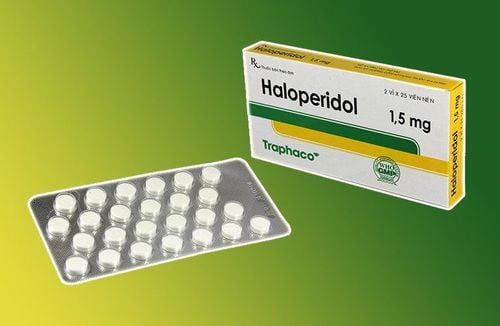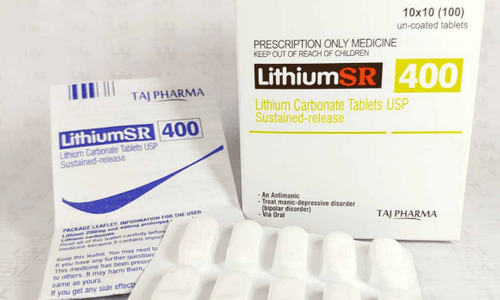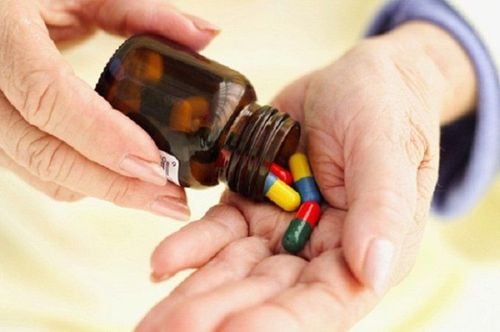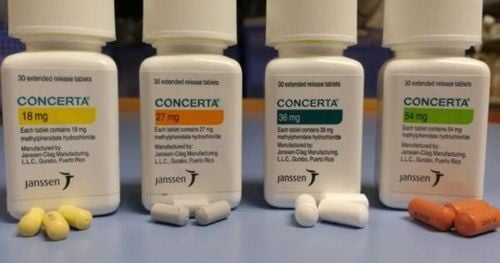This is an automatically translated article.
Risperdal 2mg is indicated in the treatment of some mental/mood disorders (such as schizophrenia, bipolar disorder, irritability.... So what is Risperdal 2mg? The following article will help you better understand the use of Risperdal 2mg.
1. What are the uses of Risperdal 2mg?
1.1. What is Risperdal 2mg? Risperdal 2 mg is a product made in the form of film-coated tablets, oblong, orange, grooved in half, box with 6 blisters, 10 tablets each. Risperdal 2 mg has the main ingredient Risperidone. Risperdal 2 mg, manufactured by Janssen Company - Cilag S.P.A., is an antipsychotic drug used in the treatment of schizophrenia.
1.2. What is Risperdal 2mg used for? Risperdal medicine 2 mg with the main ingredient is Risperidone is indicated for the treatment of the following cases:
Risperdal is indicated for the treatment of schizophrenia. Risperdal is also indicated for the treatment of mixed and acute manic episodes associated with bipolar I disorder (according to DSM IV diagnostic criteria). Risperdal is indicated for the short-term treatment of symptoms of aggressive behavior in conduct disorder in children from 5 years of age and adolescents with intellectual disability, mental retardation. Recommended for use when prescribed by pediatric neurologists and pediatric and adolescent psychiatrists Risperidone for the treatment of conduct disorder in children and adolescents. For children and adolescents weighing less than 50 kg, commercially available 1mg and 2mg film-coated tablets are no longer suitable for initial treatment and dose adjustment is required. Risperdal is indicated for the treatment of irritability associated with autism spectrum disorders: including symptoms of child aggression towards others, intentional injury, tantrums, anger and change erratic temperament.
2. How to use Risperdal 2mg
2.1. How to take Risperdal 2mg Each different drug will often have a different way of use and route of administration. The route of administration will depend on the form of the drug: whether it is an oral drug, an injection drug, an external drug or a suppository. Risperdal 2mg tablets should be taken orally, should be taken before or after meals. Dosage of Risperdal 2mg Dosage: 1 mg twice daily on day 1 in increments of 1 mg twice daily until a total dose of 6-8 mg/day is achieved in 3-7 days.
Elderly or renal & hepatic impairment: 0.5 mg x 2 times/day.
Schizophrenia: Adults
- The daily dose may be given once or in 2 divided doses.
- Risperidone should be started at a dose of 2mg/day. The dose may be increased to 4 mg on the second day. Most patients respond well to doses of 4-6 mg/day. This dose may be maintained or adjusted according to individual patient response.
- Doses above 10 mg/day have not been shown to be more effective than lower doses and may cause extrapyramidal symptoms. Doses higher than 16 mg/day should not be used because safety has not been evaluated.
Elderly people
- The recommended starting dose is 0.5 mg x 2 times/day. This dose can be adjusted in increments of 0.5 mg to a maximum of 2 mg of Risperidone per oral dose.
Bipolar disorder - manic: - Risperidone should be taken once a day. The starting dose is 2 mg. If a dose increase is required, it should be done after 24 hours and increased by 1 mg/day. Efficacy of the drug is recorded in the range of 1-6 mg/day.
Behavioral disturbances in dementia patients - Should be started with 0.25 mg twice daily. This dose may be increased by 0.25 mg twice daily depending on the individual patient. The optimal dose for most dementia patients is 0.5 mg twice daily. However, some patients require doses above 1 mg twice daily to be effective. Once the target dose is reached, this dose can be administered once a day.
- As with all symptomatic treatments, continued use of Risperidone must be assessed and adjusted on the basis of disease progression.
Autism -(Children & Adolescents): The dose of Risperidone should be prescribed by your doctor specifically according to the needs and response of each patient. In patients with hepatic and renal impairment: Patients with renal impairment have a lower clearance of the active antipsychotic fraction than in normal subjects. In patients with liver dysfunction, plasma concentrations of free risperidone are increased. Regardless of indication, initiation and continuation of dosing should be halved, and titration should be slower in patients with hepatic or renal impairment. Risperidone must be used with caution in these groups of patients. What to do if you miss a dose: What to do when you miss a dose?
If you forget to take a dose, take it as soon as you remember. However, if it is almost time for your next dose, skip the missed dose and take your next dose at the scheduled time. Do not take twice the prescribed dose.
Treatment of overdose: What to do in case of overdose?
Symptoms and signs: In general, the signs and symptoms reported have resulted from an excess of the known pharmacological action of the drug. These symptoms include somnolence and sedation, tachycardia, hypotension, and extrapyramidal symptoms. Treatment: Establish and maintain airway circulation and ensure adequate oxygenation and ventilation. Gastric lavage (after intubation, if the patient is unconscious) and the use of activated charcoal in combination with a laxative should be considered. Cardiovascular monitoring, including continuous ECG monitoring, should be initiated to detect possible arrhythmias.
3. Contraindications of Risperdal 2mg
Hypersensitivity to drug components. Because Risperdal 2 mg acts primarily on the central nervous system, caution should be exercised when co-administering with drugs that act on the central nervous system Risperidone antagonizes the effects of dopamine agonists (eg levodopa). Enhances the antihypertensive effect of antihypertensive drugs. Caution should be exercised when co-administered with drugs that prolong the QT interval. Carbamazepine and other CYP 3A4 inducers reduce plasma concentrations of risperidone with antipsychotic activity. Risperidone dose adjustment is required when starting or stopping carbamazepine and other CYP 3A4 inducers. Caution is advised when combining Risperdal 2mg with the diuretic furosemide in elderly patients with dementia due to increased mortality. Ability to drive and use machines: Patients taking Risperdal are advised not to drive or operate machinery until their sensitivities are known.
Pregnancy: Risperdal should only be used during pregnancy if the potential benefits outweigh the risks. If it is necessary to discontinue the drug during pregnancy, it should not be stopped abruptly.
Lactation: Women taking Risperdal should not breast-feed.
4. Notes when using Risperdal 2mg
Caution when using the drug in the following cases:
In elderly patients: about increased mortality in elderly patients with dementia when taking concomitantly with diuretics. Gastrointestinal agents: H2-receptor antagonists, risperidone have not shown a clinically relevant effect on the pharmacokinetics of lithium. SSRIs.
Tricyclic antidepressants
5. Side effects of Risperdal 2mg
Paliperidone is an active metabolite of the drug risperidone. Therefore, the adverse reactions of these drugs (both oral and injectable) are related:
Standing tachycardia syndrome: Related cardiac reactions Vascular events have been reported with antipsychotics that prolong the QT interval including ventricular arrhythmias, ventricular fibrillation, ventricular tachycardia, sudden death, cardiac arrest, and torsades de pointes. Venous thromboembolism Weight gain Elderly patients with dementia Recorded in clinical trials in adults; drowsiness/sedation, fatigue, headache, increased appetite, vomiting, upper respiratory tract infection, nasal congestion, abdominal pain, dizziness, cough, fever, tremor, diarrhea and enuresis. The effects of long-term risperidone treatment on sexual maturity and height have not been adequately studied.
Inform the doctor about the unwanted effects encountered when using the drug.
6. How to store Risperdal 2mg
Store at a temperature not exceeding 30°C in the original packaging and in a cool, dry place, away from direct light. Expiry date: 36 months from date of manufacture. Do not use the medicine past the expiry date indicated on the package. Keep out of reach of CHILDREN.
Please dial HOTLINE for more information or register for an appointment HERE. Download MyVinmec app to make appointments faster and to manage your bookings easily.













